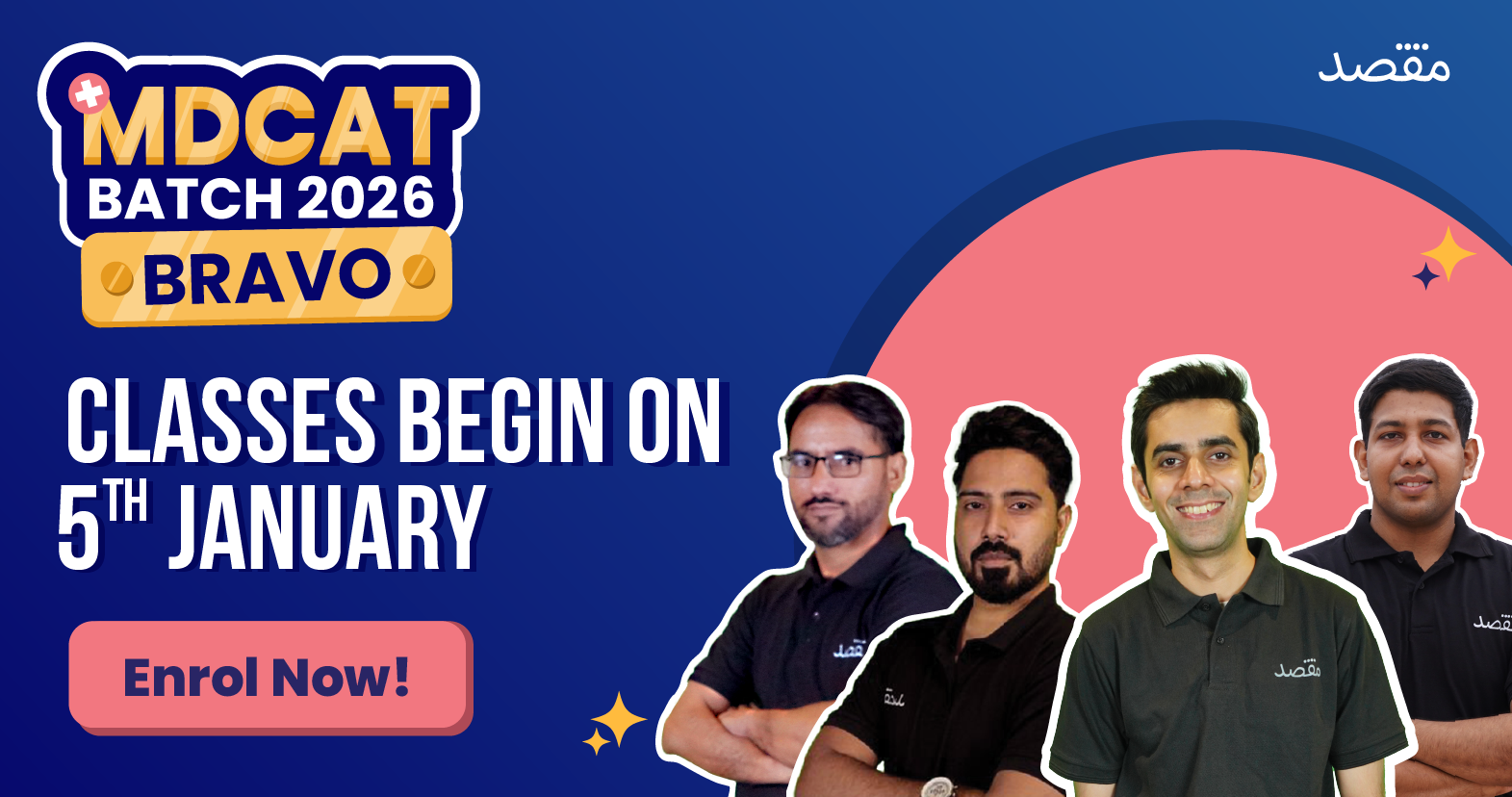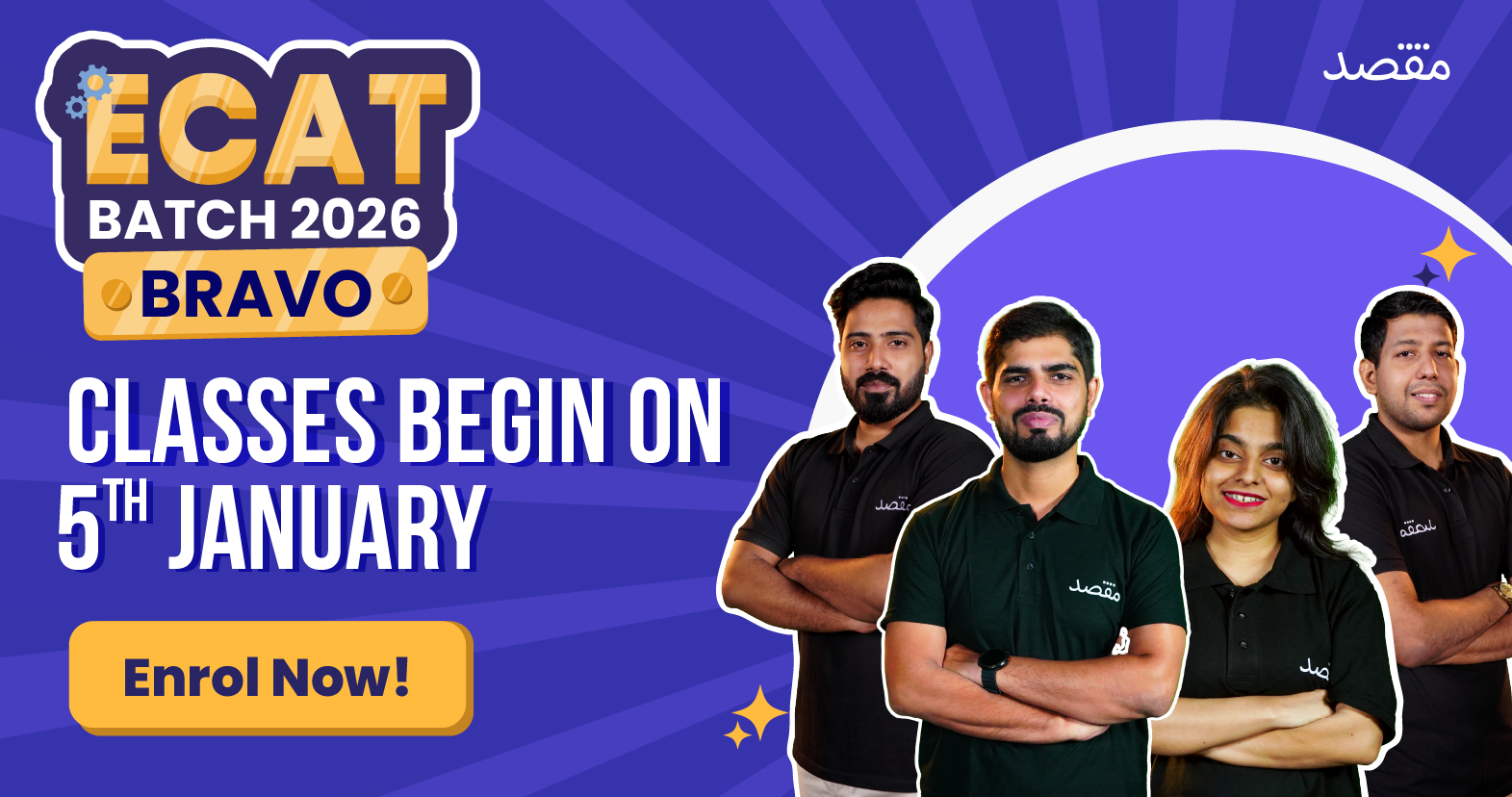
MDCAT Bravo Batch 2026
Early Admissions Open!
Kick off your MDCAT prep with daily live classes starting from 5th January! Cover the entire syllabus, attempt weekly tests and get counselling from expert teachers like Dr. Akbar

Early Admissions Open!
Kick off your MDCAT prep with daily live classes starting from 5th January! Cover the entire syllabus, attempt weekly tests and get counselling from expert teachers like Dr. Akbar

Admissions are open!
Enjoy daily live classes and recorded lectures with EDGE Learning mentors – Sir Ahmer, Sir Saad & Miss Maryam exclusively on the Maqsad app.

Want to ace the ECAT exam?
Join Maqsad’s ECAT batch, designed for high-scoring students aiming for UET, NUST, GIKI & more. With live classes, MCQs and more, secure your seat in UET Round 1 + NET Round 2 + IBA CS R1 + others!
After completing FSC Pre-Engineering, students often face the challenge of selecting the right field for higher education. With so many career paths to choose from, it’s important to select a field that not only aligns with your interests but also offers great future prospects. In this guide, we’ll explore the best fields after FSC Pre-Engineering in Pakistan for 2025, focusing on the top engineering careers, statistics, and real-world examples to help students make informed decisions.
If you're preparing for the ECAT exam, make sure to check out Maqsad’s ECAT Prep platform for expert guidance, practice tests, and more!
The Engineering College Admission Test (ECAT) is an essential exam for students seeking admission to top engineering universities in Pakistan. If you're planning to pursue any of the fields listed below, you'll likely need to clear ECAT. The exam tests students on Mathematics, Physics, Chemistry, and English, and is accepted by:
Now that we’ve explored the top engineering fields in Pakistan, you might wonder, "How do I pursue a career in one of these fields?" The journey to becoming a professional in any of these fields typically begins after completing your FSc Pre-Engineering studies. Here's what you need to know about the process:
The first step to getting into an engineering program in Pakistan is to appear for the ECAT (Engineering College Admission Test). This exam is mandatory for admission into many leading engineering universities in the country, including UET Lahore, UET Peshawar, UET Taxila, NUST, and others.
The ECAT exam is designed to assess the academic potential of students in core subjects like Mathematics, Physics, Chemistry, and English. It covers the entire FSc Pre-Engineering syllabus and is conducted once a year.
ECAT scores are crucial for your admission to top-tier engineering universities in Pakistan. These universities require both a good score in your FSc (Pre-Engineering) as well as a high score in the ECAT to secure admission.
Many students focus heavily on their FSc exams but neglect ECAT preparation, which can jeopardize their chances of admission. A well-rounded preparation strategy that includes both FSc content and ECAT-specific test practice is essential.
Here’s a list of universities in Pakistan that accept ECAT scores:
These universities are highly ranked and offer a variety of engineering programs. With a good ECAT score, you can pursue any of the previously mentioned top engineering fields like Civil Engineering, Electrical Engineering, and Computer Science.
In summary, the fields of Computer Science, Civil Engineering, Electrical Engineering, Mechanical Engineering, Biomedical Engineering, and Software Engineering are among the best options for students completing their FSc Pre-Engineering in Pakistan. These fields not only promise rewarding careers but also have significant growth potential both domestically and internationally.
To enter these fields, ECAT is a critical step, and your success in this exam can determine the trajectory of your engineering education. Maqsad provides a complete and strategic solution to help you ace the ECAT exam, ensuring you have the right resources at your fingertips.
Now that you know the pathways and options available, it’s time to take the next step. Start your preparation early, and remember, with the right approach and resources, you can achieve your dream career in engineering!
Students who have completed or are about to complete their Intermediate (F.Sc Pre-Engineering) with Physics, Chemistry, and Mathematics, or equivalent qualifications (such as A-levels) with the same subjects, are eligible to take the ECAT. An equivalence certificate from IBCC is required for A-level students.
ECAT is typically conducted once a year, often in July, but dates may vary. UET announces the exact test dates, registration deadlines, and test details on its official website a few months in advance.
There is no official "passing" score for ECAT. Instead, students’ scores are combined with their Intermediate results to form an aggregate score. Each engineering institution has its own minimum required aggregate for admission, which is usually competitive for top engineering programs.
